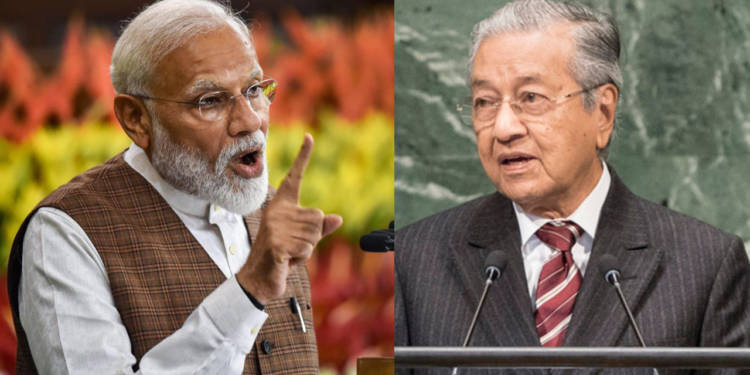Ever since Mahathir Mohamad was re-elected as Malaysia’s Prime Minister, he has been whining and crying over Malaysia’s incapability to protect its interests as Malaysia is ‘too small’ to take on the larger nations. The modus operandi of Mahathir is such that first, he digs a grave for himself and Malaysia, then takes Malaysia into the pit fully aware of the consequences and then after falling, start whining over the injustice meted out to Malaysia. India rightly punished Mahathir for his constant anti-India tirades despite several warnings as India has now restricted the palm oil imports from Malaysia which will have a devastating impact on the latter’s economy.
Unsurprisingly, Mahathir now laments that Malaysia is too small to take on India after palm oil import curbs by India.
“We are too small to take retaliatory action. We have to find ways and means to overcome that,” said Mahathir. India, the world’s largest edible oil buyer, this month halted Malaysian palm oil imports after Mahathir’s comments on Kashmir and new citizenship bill. India has been Malaysia’s top import market since 2014, according to industry data. Last year, India bought 4.4 million tonnes of palm oil from Malaysia, accounting for 24% of all Malaysian palm oil exports. The second-biggest buyer of Malaysian palm oil, China, bought just 2.4 million tonnes last year, while the third-largest buyer was Pakistan with 1.08 million tonnes, according to data from the Malaysian Palm Oil Council.
Rightly, so many people in Malaysia including the media and Mahathir’s allies are questioning his decision to take an anti-India stance and ally with Pakistan and China despite the fact that India alone accounts for more palm oil imports than Pakistan and China combined.
As Mahathir pushes Malaysia towards Wahabism, even Pakistan Prime Minister Imran Khan who has more often than not been the subject of ridicule and continues to be a puppet, rejected Mahathir’s invitation under pressure from Saudi Arabia. Perhaps, Mahathir is the only leader in the world, who has been rejected by Imran Khan.
What Mahathir fails to acknowledge is that he should not have interfered in India’s internal matters, from Kashmir to the CAA. As if Messiah of global Islam, Mahathir’s statements have been on the offensive and a shock for India which does not speak on Malaysia’s internal matters. Despite the deteriorating Indo-China ties and China’s continued interference in India’s internal matters, India till date has not taken a hardline position on Tibet or Uighur Muslims respecting China’s sovereignty.
While equality and freedom of religion are strongly expressed in India’s constitution, religious freedom is a contentious issue in Malaysia. Islam is the most preferred religion and is needed to be followed in order to identify with the ‘Malay’- son-of-the-soil identity.
As per Article 160 of the Constitution of Malaysia, one must be Muslim to be considered Malay. In practice, Muslims cannot convert to another religion due to the Sharia courts denying conversion claims, and if a Malay did convert they would lose their status as Bumiputera. By opposing the CAA, Dr Mahathir only exposes his hypocrisy as his bid to promote Malay supremacy through the 80s and 90s continues to subjugate minority rights as the dwindling minority populations buttress the flight of capital and human resources. The Malaysian Prime Minister’s preferential bid to promote his ethnic community such as all senior bureaucratic positions are reserved for Malays has drawn repeated global flak for rampant human rights violations, lack of accountability, transparency and unsound economics such as the dud Proton car project. But, the Prime Minister, who the Malays fondly refer to as Dr M, continues to remain wedded to majority appeasement.
There are enough reasons to condemn Malaysia’s majoritarian politics and policies, however, India’s age-old policy of not interfering in the internal matters of other nations has lived on.
But if this is being used against India itself, then it shows that Mahathir is not concerned about Indo-Malaysian ties. In that case, India has every precedent to look for an alternative and to register its protests by curbing imports.
Mahathir, to retain his local clout may try to claim that Malaysia is being bullied by India, but that is not the case. Even his allies have lost hope in him and are hoping that the new Prime Minister of Malaysia can undo the damage done to bilateral ties between India and Malaysia, but it might be the case of too little, too late.























